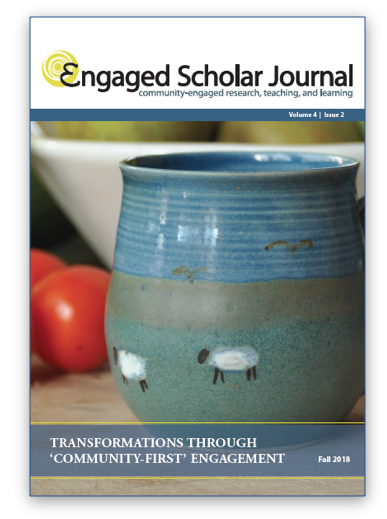“Community First” for Whom? Reflections on the Possibilities and Challenges of Community-Campus Engagement from the Community Food Sovereignty Hub
DOI:
https://doi.org/10.15402/esj.v4i2.61747Keywords:
community-campus engagement, community first, food sovereignty, food systems, Canada, community-based researchAbstract
While community-campus engagement (CCE) has gained prominence in postsecondary institutions, critics have called for a more direct focus on community goals and objectives. In this paper, we explore the possibilities and limitations of community-centred research through our collective experiences with the Community First: Impacts of Community Engagement (CFICE) and the Community Food Sovereignty (CFS) Hub. Drawing on a four-year research project with twelve community-campus partnership projects across Canada, we outline three key areas for reflection. First, we examine the meanings of community-centred research—called “community first”—in our work. Second, we explore key tensions that resulted from putting “community first” research into practice. Third, we discuss possibilities that emerged from attempts to engage in “community first” CCE. We suggest that while putting “community first” presents an opportunity to challenge hierarchical relationships between academia, western ways of knowing, and community, it does not do so inherently. Rather, the CCE process is complex and contested, and in practice it often fails to meaningfully dismantle hierarchies and structures that limit grassroots community leadership and impact. Overall, we argue for the need to both champion and problematize “community first” approaches to CCE and through these critical, and sometimes difficult conversations, we aim to promote more respectful and reciprocal CCE that works towards putting “community first.”
Downloads
Published
How to Cite
Issue
Section
License
Authors who publish with this journal agree to the following terms:
- Authors retain copyright and grant the journal right of first publication with the work simultaneously licensed under a Creative Commons Attribution License CC BY 4.0 that allows others to share the work with an acknowledgement of the work's authorship and initial publication in this journal.
- Authors are able to enter separate, additional contractual agreements for the non-exclusive distribution of the journal's published version of the work (e.g., post it to an institutional repository or publish it in a book), with an acknowledgement of its initial publication in this journal.
- Authors are permitted to post their work online (e.g., in an institutional repository or on their website) after the publication of their work in the Engaged Scholar Journal.
- Please note that while every opportunity will be taken to ensure author participation in the editing process, due to time constraints final copyediting changes may be made before publication to ensure APA adherence throughout all submissions.




